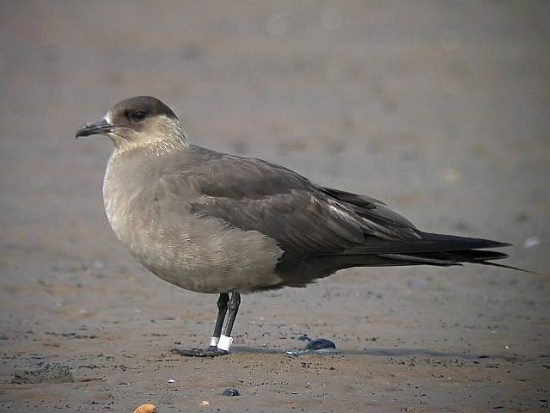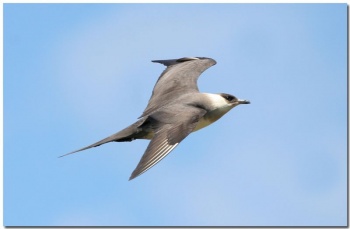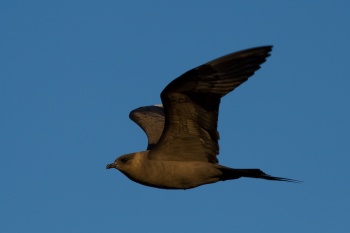m (songs) |
m (→External Links) |
||
| (27 intermediate revisions by 8 users not shown) | |||
| Line 1: | Line 1: | ||
| − | {{ | + | '''Alternative names: Arctic Skua, Parasitic Skua''' |
| + | [[Image:Parasitic_Jaeger.jpg|thumb|550px|right|Adult dark morph<br />Photo © by {{user|IanF|IanF}}<br /> Cleveland, [[UK]], 22nd July 2003]] | ||
;[[:Category:Stercorarius|Stercorarius]] parasiticus | ;[[:Category:Stercorarius|Stercorarius]] parasiticus | ||
| − | |||
| − | |||
==Identification== | ==Identification== | ||
| − | + | [[Image:Juv flight 21IMG 6055ao.JPG|thumb|350px|right|Juvenile in flight<br />Photo © by {{user|IanF|IanF}}<br />Juvenile, Seaton Snook, Cleveland, [[UK]], 31 August 2006 ]] | |
| + | 41-48 cm (16-19") including pointed tail projection<br /> | ||
| + | *Elongated central tail feathers (just noticeable in juveniles). | ||
| + | *White wing flash<br /> | ||
| + | '''Dark Morph''' and Young are brown apart from the whitish patch near wing tip.<br /> | ||
| + | '''Light Morph''' have creamy-white underparts, cheeks and neck (barred brown in winter) and a dark cap.<br /> | ||
| + | '''Intermediates''' have variable amounts of light and dark plumage: some are brown with dark cap, others brown with yellow neck-ring. | ||
| + | *In the North Atlantic, light morphs predominate at higher latitudes while in dark morphs predominate further south. The genetics of the polymorphism is more complex than previously believed. It involves three different linked non-synonymous mutations at the plumage color locus rather than the single mutation previously known<sup>[[#References|[3]]]</sup>. | ||
| + | ====Similar Species==== | ||
| + | [[Pomarine Jaeger]], [[Long-tailed Jaeger]]. | ||
| − | |||
==Distribution== | ==Distribution== | ||
| − | [[Alaska]], [[Canada]], [[Greenland]], [[Iceland]], [[Scandinavia]], and northern [[Russia]]. | + | [[Alaska]], [[Canada]], [[Greenland]], [[Iceland]], [[Scandinavia]], and northern [[Russia]]. Winters at sea in southern oceans. |
| − | |||
==Taxonomy== | ==Taxonomy== | ||
| + | Monotypic<sup>[[#References|[1]]]</sup> | ||
| + | [[Image:Arctic Skua.jpg|thumb|350px|right|Adult, light morph in flight<br />Photo © by {{user|Terry+W|Terry W}} <br />[[Handa Island]], [[Scotland]], 14 June 2007]] | ||
==Habitat== | ==Habitat== | ||
| − | + | Breeds on dry tundra, higher fells and islands. Otherwise pelagic but close to land. | |
==Behaviour== | ==Behaviour== | ||
| − | Up to four olive-brown eggs are laid. | + | Bird Forum thread for jizz and behaviour-based [http://www.birdforum.net/showthread.php?t=15951 ID tips] |
| + | ====Flight==== | ||
| + | Rather hawk-like and bouyant. Chases other birds. | ||
| + | ====Breeding==== | ||
| + | Breeds in loose colonies<br /> | ||
| + | Up to four olive-brown eggs are laid on the ground. | ||
| + | ====Diet==== | ||
| + | [[Image:Artic Skua MG 0610-2-1.jpg|thumb|350px|right|Adult, dark morph<br />Photo © by{{user|Tichodroma|Tichodroma}}<br />[[Iceland ]], 30 June 2007 ]] | ||
| + | Diet includes lemmings and other rodents. Robs other birds of their fish catch. | ||
| + | ===Vocalisation=== | ||
| + | {{ Audio|Stercorarius parasiticus (song).mp3 }} | ||
| + | ''[[Media:Stercorarius parasiticus (song).mp3|Parasitic Jaeger voice clip]]'' | ||
| + | ==References== | ||
| + | #{{Ref-Clements6thAug18}}#Furness, R.W., Boesman, P. & Garcia, E.F.J. (2018). Arctic Jaeger (''Stercorarius parasiticus''). In: del Hoyo, J., Elliott, A., Sargatal, J., Christie, D.A. & de Juana, E. (eds.). Handbook of the Birds of the World Alive. Lynx Edicions, Barcelona. (retrieved from https://www.hbw.com/node/53959 on 3 September 2018). | ||
| + | #Janssen, K. and Mundy, N. I. (2013), Molecular population genetics of the melanic plumage polymorphism in Arctic skuas (Stercorarius parasiticus): evidence for divergent selection on plumage colour. Mol Ecol, 22: 4634-4643. doi:10.1111/mec.12428 | ||
| + | #Wiley, R. H. and D. S. Lee (1999). Parasitic Jaeger (Stercorarius parasiticus), version 2.0. In The Birds of North America (A. F. Poole and F. B. Gill, Editors). Cornell Lab of Ornithology, Ithaca, NY, USA. https://doi.org/10.2173/bna.445 | ||
| + | #Wikipedia contributors. (2018, August 22). Parasitic jaeger. In Wikipedia, The Free Encyclopedia. Retrieved 09:43, September 3, 2018, from https://en.wikipedia.org/w/index.php?title=Parasitic_jaeger&oldid=855960808 | ||
| + | #[http://www.answers.com Answers.com] | ||
| + | #Birdwatchers Pocket Guide ISBN 1-85732-804-3 | ||
| + | #Collins Pocket Guide to British Birds 1966 | ||
| + | #Collins Field Guide 5th Edition | ||
| + | {{ref}} | ||
| − | + | ==External Links== | |
| + | {{GSearch|"Stercorarius parasiticus" {{!}} "Parasitic Jaeger" {{!}} "Arctic Skua" {{!}} "Parasitic Skua"}} | ||
| + | {{GS-checked}}1 | ||
| + | <br /> | ||
| + | <br /> | ||
| − | |||
| − | |||
| − | |||
| − | |||
| − | |||
| − | |||
| − | |||
| − | |||
| − | |||
[[Category:Birds]] [[Category:Stercorarius]] [[Category:Bird Songs]] | [[Category:Birds]] [[Category:Stercorarius]] [[Category:Bird Songs]] | ||
Latest revision as of 20:33, 2 February 2023
Alternative names: Arctic Skua, Parasitic Skua
- Stercorarius parasiticus
Identification
41-48 cm (16-19") including pointed tail projection
- Elongated central tail feathers (just noticeable in juveniles).
- White wing flash
Dark Morph and Young are brown apart from the whitish patch near wing tip.
Light Morph have creamy-white underparts, cheeks and neck (barred brown in winter) and a dark cap.
Intermediates have variable amounts of light and dark plumage: some are brown with dark cap, others brown with yellow neck-ring.
- In the North Atlantic, light morphs predominate at higher latitudes while in dark morphs predominate further south. The genetics of the polymorphism is more complex than previously believed. It involves three different linked non-synonymous mutations at the plumage color locus rather than the single mutation previously known[3].
Similar Species
Pomarine Jaeger, Long-tailed Jaeger.
Distribution
Alaska, Canada, Greenland, Iceland, Scandinavia, and northern Russia. Winters at sea in southern oceans.
Taxonomy
Monotypic[1]
Habitat
Breeds on dry tundra, higher fells and islands. Otherwise pelagic but close to land.
Behaviour
Bird Forum thread for jizz and behaviour-based ID tips
Flight
Rather hawk-like and bouyant. Chases other birds.
Breeding
Breeds in loose colonies
Up to four olive-brown eggs are laid on the ground.
Diet
Diet includes lemmings and other rodents. Robs other birds of their fish catch.
Vocalisation
References
- Clements, J. F., T. S. Schulenberg, M. J. Iliff, D. Roberson, T. A. Fredericks, B. L. Sullivan, and C. L. Wood. 2018. The eBird/Clements checklist of birds of the world: v2018. Downloaded from http://www.birds.cornell.edu/clementschecklist/download/
- Furness, R.W., Boesman, P. & Garcia, E.F.J. (2018). Arctic Jaeger (Stercorarius parasiticus). In: del Hoyo, J., Elliott, A., Sargatal, J., Christie, D.A. & de Juana, E. (eds.). Handbook of the Birds of the World Alive. Lynx Edicions, Barcelona. (retrieved from https://www.hbw.com/node/53959 on 3 September 2018).
- Janssen, K. and Mundy, N. I. (2013), Molecular population genetics of the melanic plumage polymorphism in Arctic skuas (Stercorarius parasiticus): evidence for divergent selection on plumage colour. Mol Ecol, 22: 4634-4643. doi:10.1111/mec.12428
- Wiley, R. H. and D. S. Lee (1999). Parasitic Jaeger (Stercorarius parasiticus), version 2.0. In The Birds of North America (A. F. Poole and F. B. Gill, Editors). Cornell Lab of Ornithology, Ithaca, NY, USA. https://doi.org/10.2173/bna.445
- Wikipedia contributors. (2018, August 22). Parasitic jaeger. In Wikipedia, The Free Encyclopedia. Retrieved 09:43, September 3, 2018, from https://en.wikipedia.org/w/index.php?title=Parasitic_jaeger&oldid=855960808
- Answers.com
- Birdwatchers Pocket Guide ISBN 1-85732-804-3
- Collins Pocket Guide to British Birds 1966
- Collins Field Guide 5th Edition
Recommended Citation
- BirdForum Opus contributors. (2024) Parasitic Jaeger. In: BirdForum, the forum for wild birds and birding. Retrieved 3 May 2024 from https://www.birdforum.net/opus/Parasitic_Jaeger
External Links
GSearch checked for 2020 platform.1







